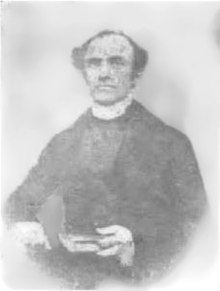Enrico Tazzoli
Don Enrico Tazzoli (* 1812 in Canneto sull'Oglio , Province of Mantua , † December 7, 1852 in Belfiore near Mantua) was an Italian priest and freedom fighter.
Life
Enrico Tazzoli was the son of a judge and a teacher. In 1835 he was ordained a priest and was then pastor in Goito and Mantua for many years . When the Austrians besieged Mantua in March and April 1848 and finally occupied it, there were numerous attacks against the civilian population and also against the Basilica of Sant'Andrea .
On November 12, 1848, Tazzoli gave a sermon in the basilica in which he indirectly condemned Austrian rule in northern Italy by clearly making comparisons with the Sacco di Mantova of 1630 and calling the imperial family tyrants . Since the Austrian secret police followed all his sermons, he was immediately arrested and imprisoned in the fortress of Mantua. The Bishop of Mantua, Giovanni Corti , was told that Tazzoli was a reactionary and that his sermons were subversive. A court later acquitted Enrico Tazzoli. However, the bishop had to order further training for his pastor. Shortly thereafter, Tazzoli was arrested again but had to be released. From 1848 to 1849 the Austrians executed approx. 1000 people in the Kingdom of Lombardy-Veneto, which was linked to the Austrian Empire by personal union .
In the following years Tazzoli took part in the republican and democratic freedom movement led by Giuseppe Mazzini . In November 1850 he founded a liberation committee in Mantua, on which numerous well-known personalities of the Risorgimento worked, including Tito Speri and Carlo Poma . The committee mainly distributed leaflets criticizing the Austrian rule in northern Italy.
On January 27, 1852, the Austrian police managed to arrest Tazzoli and other comrades-in-arms. The subsequent process lasted until the beginning of 1853. During this time almost all of Tazzoli's comrades-in-arms were brutally tortured and forced to make confessions, which were usually followed by death sentences. Those who like Giuseppe Finzi managed to assert his innocence to the end, was sentenced to long prison terms. Tazzoli himself tried again and again to downplay the role of his colleagues. He was sentenced to death by hanging along with Poma and several others and executed on December 7, 1852 in the fortress of Belfiore near Mantua. Further executions, etc. a. that of Speri followed in 1853.
Pope Pius IX That because of the Italian unification movement around his worldly influence and to his Church government feared that the continued secularization Tazzolis and all others, by the Austrians of Subversion accused priests through. These degrading ceremonies were performed shortly before the execution of the death sentences.
By 1854 there were numerous peasant uprisings in the Mantua area, all of which were suppressed. Austrian rule in Lombardy ended in 1859 with Austria's defeat in the Sardinian War .
Because of his upright and fearless demeanor and because of his tragic death, Enrico Tazzoli is one of the most important figures in the Italian unification movement.
| personal data | |
|---|---|
| SURNAME | Tazzoli, Enrico |
| BRIEF DESCRIPTION | Italian priest and freedom fighter |
| DATE OF BIRTH | 1812 |
| PLACE OF BIRTH | Canneto sull'Oglio near Mantua |
| DATE OF DEATH | December 7, 1852 |
| Place of death | Belfiore near Mantua |
